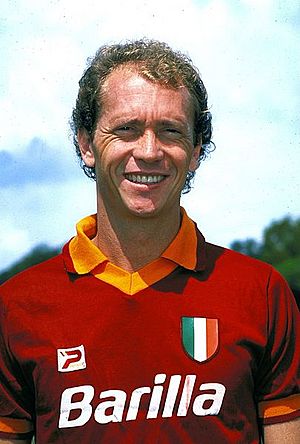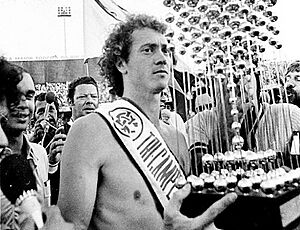Paulo Roberto Falcão facts for kids

Falcão with Roma during the 1983–84 Serie A season
|
|||
| Personal information | |||
|---|---|---|---|
| Full name | Paulo Roberto Falcão | ||
| Date of birth | 16 October 1953 | ||
| Place of birth | Abelardo Luz, Brazil | ||
| Height | 1.83 m (6 ft 0 in) | ||
| Position(s) | Midfielder | ||
| Youth career | |||
| 1965–1972 | Internacional | ||
| Senior career* | |||
| Years | Team | Apps | (Gls) |
| 1972–1980 | Internacional | 342 | (58) |
| 1980–1985 | Roma | 107 | (22) |
| 1985–1986 | São Paulo | 12 | (0) |
| Total | 461 | (80) | |
| International career | |||
| 1972 | Brazil U23 | 12 | (2) |
| 1976–1986 | Brazil | 34 | (6) |
| Managerial career | |||
| 1990–1991 | Brazil | ||
| 1991–1992 | Club América | ||
| 1993 | Internacional | ||
| 1994 | Japan | ||
| 2011 | Internacional | ||
| 2012 | Bahia | ||
| 2015–2016 | Sport Recife | ||
| 2016 | Internacional | ||
| *Club domestic league appearances and goals | |||
Paulo Roberto Falcão (born October 16, 1953), known simply as Falcão, is a Brazilian football legend. He is famous for being one of the best midfielders of all time, especially in the 1980s. He was a smart and skillful player who could both defend and attack.
Falcão is a hero at two major clubs: Internacional in Brazil and Roma in Italy. He also played for São Paulo. For a time, he was the highest-paid football player in the world.
His amazing performances for Roma earned him the nickname "the eighth King of Rome" from the fans. In 2013, he was added to the club's Hall of Fame. For the Brazil national team, he played in the famous 1982 FIFA World Cup. He was part of a legendary midfield with stars like Zico and Sócrates.
Contents
Club Career
Starting at Internacional
Falcão started his career at Internacional, a club in his home country of Brazil. He played there from 1972 to 1980. During his time at the club, he was a star player.
He helped Internacional win three Brazilian National Championships in 1975, 1976, and 1979. He was so good that he won the Golden Ball award for being the best player in the Brazilian league two years in a row (1978 and 1979).
Becoming a King in Rome
In 1980, Falcão moved to Italy to play for Roma. He quickly learned the Italian language and became a fan favorite. In his first season, he helped Roma win the Coppa Italia, which is Italy's main cup competition.
The next few years were even better. In the 1982–83 season, Falcão led Roma to win the Serie A league title for only the second time in the club's history. He scored seven goals and was seen as the best player in the league. This is when the fans started calling him "the eighth King of Rome."
In the 1983–84 season, Roma's biggest goal was to win the European Cup (now called the Champions League). The final was even held at their home stadium in Rome. Falcão was injured before the semi-final but returned to help his team reach the final against Liverpool. After a 1–1 draw, the game went to a penalty shootout, which Roma lost. This was a difficult moment for Falcão and the club. After some knee problems, his time in Rome ended in 1985.
Return to Brazil
After leaving Roma, Falcão returned to Brazil and signed with São Paulo. He helped them win the Campeonato Paulista (a regional championship) in 1985. He played for São Paulo for two seasons before retiring from professional football after the 1986 World Cup.
Playing for Brazil
Falcão played 34 times for the Brazil national team between 1976 and 1986. He is most remembered for his role in the 1982 FIFA World Cup in Spain.
The Legendary 1982 World Cup Team
The 1982 Brazil team is often called one of the greatest teams to never win the World Cup. Falcão was a key part of a magical midfield that included Zico, Sócrates, and Éder. They played beautiful, attacking football that everyone loved to watch.
Falcão scored a great goal against Scotland and another against New Zealand in the first round. In the second round, Brazil faced a tough group with Argentina and Italy. They beat Argentina 3–1 and needed only a draw against Italy to move on.
In a classic match, Italy took the lead, but Brazil fought back. Falcão scored a powerful goal to tie the game at 2–2. However, Italy's striker Paolo Rossi scored a third goal, and Brazil lost 3–2. The defeat was heartbreaking for the players and fans.
Final World Cup Appearance
Falcão was also part of Brazil's squad for the 1986 World Cup in Mexico. He played in two games as a substitute. Brazil was knocked out in the quarter-finals by France. After this tournament, Falcão retired from playing football.
What Was Falcão's Playing Style?
Falcão was a very elegant and intelligent player. He played as a deep-lying playmaker, which means he controlled the game from a deep position in the midfield. He was known for his amazing vision, precise passing, and powerful long-range shots.
He was not just an attacker. Falcão was also a hard worker who could defend well. He was a great leader on the field, organizing his team and telling players where to go. His all-around ability made him one of the most complete midfielders of his generation.
Life After Playing
After he stopped playing, Falcão became a football manager. He coached several teams, including the Brazil national team from 1990 to 1991. He also managed the Japan national team and his old clubs, Internacional and América of Mexico.
Falcão also worked for many years as a football expert and commentator on television for Rede Globo in Brazil.
Personal Life
Falcão was born in Abelardo Luz, a town in southern Brazil. His father is of Portuguese descent, and his mother has Italian roots.
He has been married to journalist Cristina Ranzolin since 2003. They have a daughter named Antônia. He also has a son from a previous marriage.
Honours
Internacional
- Campeonato Gaúcho: 1973, 1974, 1975, 1976, 1978
- Campeonato Brasileiro Série A: 1975, 1976, 1979
Roma
- Coppa Italia: 1980–81, 1983–84
- Serie A: 1982–83
São Paulo
- Campeonato Paulista: 1985
Individual Awards
- Bola de Ouro (Brazilian Golden Ball): 1978, 1979
- FIFA World Cup All-Star Team: 1982
- FIFA 100 (List of the 125 Greatest Living Footballers by Pelé): 2004
- A.S. Roma Hall of Fame: 2012
- Italian Football Hall of Fame: 2016
- Golden Foot: 2019, as a football legend
See also
 In Spanish: Paulo Falcão para niños
In Spanish: Paulo Falcão para niños
 | James Van Der Zee |
 | Alma Thomas |
 | Ellis Wilson |
 | Margaret Taylor-Burroughs |


